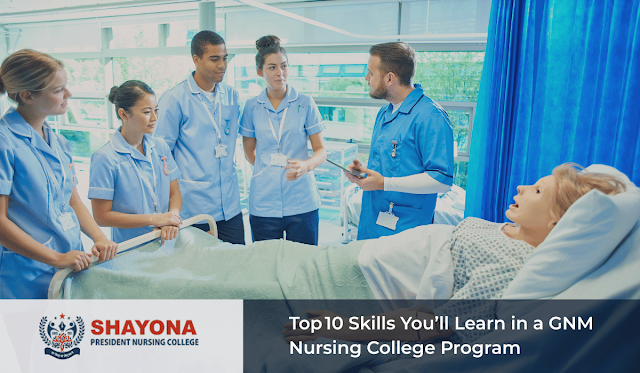Top 10 Skills You’ll Learn in a GNM Nursing College Program
Unlocking the capabilities that shape competent healthcare professionals
Starting a career in general nursing and midwifery is both a thrilling and challenging journey. During your very first semester—perhaps while settling into a gnm nursing college ahmedabad campus—you’ll discover that the classroom is only half the story; the remainder unfolds in simulation labs, clinical rounds, and community outreach. Each experience stacks practical know‑how onto a sturdy base of theory, building a toolkit that stays with you throughout your professional life. Below, we explore ten indispensable skills developed during a three‑year diploma, why they matter to patient care, and how they translate into day‑one workplace readiness.
1. Evidence‑Based Assessment & Documentation
Accurate patient assessment underpins every clinical decision. Students practice systematic head‑to‑toe examinations, recognize normal versus abnormal findings, and record them using standardized electronic formats. By graduation, you can generate concise care notes, spot trends in vitals, and flag subtle warning signs long before complications escalate.
2. Medication Administration & Safety Protocols
From calculating pediatric dosages to managing multidrug infusions, trainees master “six rights” checks—right patient, drug, dose, route, time, and documentation—while becoming fluent in pharmacology basics. Safe administration habits are drilled until reflexive, reducing medication‑error risk in hospitals and community settings alike.
3. Therapeutic Communication & Counseling
Active listening, open‑ended questioning, and culturally sensitive counseling are honed through role‑play and real‑world encounters. Whether delivering discharge advice or supporting a new parent, you learn to build rapport quickly, empowering individuals to participate fully in their healthcare journey.
4. Infection‑Control Mastery
Rigorous hand‑hygiene technique, isolation precautions, sterile dressing changes, and instrument processing become second nature. Students also study global antimicrobial resistance trends, enabling them to champion stewardship initiatives in future workplaces.
5. Maternal & Neonatal Care Competence
Midwifery postings immerse learners in antenatal exams, intrapartum monitoring, safe delivery practices, and postnatal assessments. Handling newborn resuscitation manikins gives confidence for real emergencies, while community visits highlight the importance of early breastfeeding support and immunization advocacy.
After the initial deep dive into these five pillars—around one‑third of the course content—you’ll appreciate why alumni often describe their alma mater as the best gnm nursing college in ahmedabad for hands‑on exposure.
6. Emergency & Trauma Response
Structured scenarios teach rapid prioritization: airway, breathing, circulation. Students interpret ECG strips, initiate CPR, manage shock, splint fractures, and assist in mass‑casualty drills arranged with local authorities. Such readiness saves precious minutes when every second counts.
7. Community Health & Preventive Outreach
Rotations in rural clinics and urban slums reinforce primary‑care principles: health education, sanitation campaigns, vector‑control surveys, and nutritional assessments. You’ll organize awareness drives on hypertension, diabetes, and adolescent reproductive health, witnessing firsthand how prevention reduces hospital load.
8. Leadership & Team Coordination
Shift‑leading simulations introduce delegation, conflict resolution, and resource allocation. By supervising juniors in skill labs, you cultivate mentorship habits vital for ward management or public‑health program coordination later in your career.
9. Digital Health Literacy
Electronic medical records, tele‑consultation platforms, and point‑of‑care devices are embedded throughout the curriculum. Familiarity with data privacy regulations, basic troubleshooting, and remote patient‑monitoring tools ensures you keep pace with digitized healthcare ecosystems.
10. Ethical Reasoning & Professional Accountability
Case discussions on consent, end‑of‑life decisions, and equity sharpen moral judgment. Students review national practice standards, legal frameworks, and global charters, internalizing the duty of care that underlines trustworthy practice.
Quick‑Reference Skill Set
• Systematic patient assessment
• Safe medication delivery
• Compassionate communication
• Infection‑control procedures
• Maternal‑neonatal support
• Emergency response
• Community‑health promotion
• Leadership & delegation
• Tech‑enabled care
• Ethical decision‑making
At approximately the sixty‑percent mark of your studies—when you’re alternating between specialty wards and outreach camps—you’ll reflect on how these proficiencies distinguish graduates of gnm nursing colleges in ahmedabad within national hiring pools. Employers value practitioners who can switch seamlessly from bedside monitoring to family counseling, from digital charting to leading a health‑awareness rally.
Conclusion
A diploma in general nursing and midwifery is more than a qualification; it’s a structured journey that turns novices into versatile care providers. Mastery of assessment, medication safety, communication, infection control, maternal care, emergency response, community outreach, leadership, digital tools, and ethics equips you to thrive across hospitals, public‑health missions, and tele‑health startups. As you evaluate programs—public or private—remember that the best government nursing colleges in gujarat consistently embed these ten competencies into everyday learning, ensuring graduates deliver safe, empathetic, and forward‑thinking care from their very first shift.



Comments